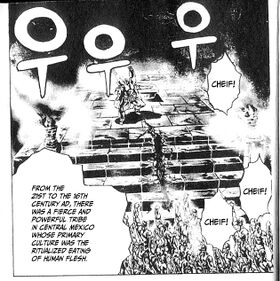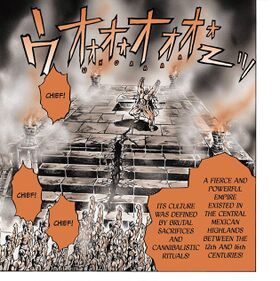
|

|
Strongman Front (強人陣線) is a popular Taiwanese manga series written and illustrated by Feiyan Huang. It was first published in 1977 by Tong Li Comics.
When JoJo was first brought into Korea, it was illegally distrubted under the name, "Megaton Man." The series was originally published in Super Jump, a Korean bootleg version of Weekly Shonen Jump magazine (not to be confused with the real Super Jump). This bootleg magazine was shortlived, and vanished once the first volume was complete with the rest of the series only being released in tankobon format. The translator is credited as "Park Ryeon," however, the legitimacy of this name remains unknown. Megaton Man covers the first 5 parts of the series, ending its published before the completion of Vento Aureo. Despite being divided into seperate volumes, the contents of these volumes bare no resemblance to the official release. These volumes also have a much higher page count than their Japanese counterparts.
Up until 2013, when the series was first officially released in Korea, Megaton Man had been the most circulated bootleg release of JoJo in existence. This was both due its popularity in Korea, and the fact that the series was printed in much larger quantities than bootlegs in other countries. In Korea, if a book sold in a second-hand or rental store were too low in demand, then the book would be thrown away for taking up space. Conversely, for popular series such as JoJo and Fullmetal Alchemist, which were high in demand, it wasn't uncommon to find respectable stores putting bootlegs copies on the shelves. However, when the series went out of print in the late 2000s, the bootleg faded into obscurity. It was only when the anime came out that Megaton Man saw a resurgence in popularity, with volumes sold today being priced comparable higher than they originally were. Despite just being a crappy bootleg, Megaton Man has gained a large following due to its comedically bad translations (sort of like a Korean version of Duwang). While these poor translations completely ruin the serious tone of the series, their strange nature only serves to exemplify the bizarreness that the series is known for. For this reason, Megaton Man has become a cult classic among Korean JoJo fans, with some even going as to say that it shouldn't be compared to the original.
As a result of the bootleggers likely trying to target a bigger demographic, a lot of dialouge in Megaton Man has been toned down to suit general audiences of the 80s and 90s. All the characters use respectful language when talked to their seniors, and every instance of bad language has been removed or replaced with cleaner alternates. For example, during the scene where Dio curses his father and spits on his grave in Part 1, all the cursing was removed and the spit was whited out. Due the cultural stima toward profanity that existed in Korea at the time, these changes were unavoidable, however, the nature of these changes are strangely inconsistent. Many lines in the original that were normally clean have been replaced with much more profane version in the Megaton Man version. For example, after getting beaten up for trying to save Erina from the bullies teasing her, Jonathan takes out his anger and tells Erina to go "f*ck" herself when she comes to his aid. Aside from that, the use of alcohol and cigarettes are still present despite supposedly being "modified and adapted to suit the environment and emotions of boys and girls."
Most of the names in Megaton Man have have been altred--a common practice among bootlegs--with characters often having their names change to some weird pronounciation or something else completly different made up by the translator. Erina Pendleton becomes "Erina Pendlelon," Zeppeli becomes "Perio," Speedwagon becoming "Peace, the Angel of Darkness," Lisa Lisa becomes "Lisa," Polnareff becomes "Paul," and Bruno Buccellati becoming "Sofia Buccellati." Japanese names suffered a much worse fate, with Jotaro Kujo becoming a boy from Hong Kong with the quirky nickname "JoJo-chan." Stands were also intially called Shadows (purse owner reference), but suddenly switched back to being called Stands in Part 4. Even Jotaro's famous "Ora Ora Ora!" was changed to what I can only assume is just screaming in Korean. Some of these dialouge changes in Megaton Man give it a much more homoerotic feel, even more so than the original. Especially for Dio, who is depicted as bisexual in Part 1 long before it alluded to in the original. There's also a suspicion that the translator's favourite character is Polnareff, as a lot of dialouge was changed in his favour. On the other hand, there a some translation changes in Megaton Man that are so good that they almost surpass the original (even if they're few in the dozen). For example, when Speedwagon asks Jonathan why he didn't clobber him with all he had, he responds "I'm here for my father. Everyone has parents, sibilings, neighbors. Think of how sad they would've be." This line is a lot more considerate and shows concern for more characters than the original.
Just like Duwang, many words and phrases from Megaton Man have been parodied and turned into internet memes online. These colloquialisms include Dio wimpering "You disgusting idiot!" (더러운 바보가~!) from Part 1, Jotaro shouting "Haaargh! I don't know anything anymore!" (히요옷~ 나도 이젠 모른다!"), and Gold Experience being called (literally) a "gold experience" (황금체험) in Part 5.
Megaton Man was adapted and translated under the "Korean Publication Ethics Committee," or at least that's what is written inside the cover alongside the message "This book has been modified and adapted to suit the environment and emotions of boys and girls." At the time, even bootlegs weren't spared from the scrutiny of Korea's harsh cenorship laws and the overall negative stigma of manga. Furthermore, if you wanted to published a manga intended for kids, changes and modifications were mandatory. The problem is that these changes were sometimes left unchecked, and many of the translations that made it through ended up more inappropriate for kids than the original. This serves as a stark reminder of how arbitrary, unprofessional, and inconsistent censorship laws were back then. If I showed you what's about to come, and then showed you the message on the cover again, you'd think "That's a load of bullshit!"
| Original Name |
Megaton Man |
|---|---|
| Jonathan Joestar | Jonathan Joester |
| Dio Brando | Dio Brand / Dio Brandi |
| Erina Pendleton | Erina Pendlelon |
| Sir Joestar | Sir Jonathan Joester's Father |
| Robert E. O. Speedwagon | Peace, the Angel of Darkness |
| Will Anthonio Zeppeli | Perio / Perry |
As mentioned before, many of the names in Megaton Man have been changed, which is befitting of a bootleg manga. These names are much better than what would appear in later parts, though that isn't saying much. Almost every character has had their name changed, except Danny for some reason. Even the naming conventions are bizarre. Zeppelli seems to be named after some sort of toothpaste and Wang Chan is just a Chinese merchant. Ogre Street has been renamed to Cula Town, which is probably a reference to Dracula. The name Speedwagon has been removed entirely with "Peace, the Angel of Darkness." Whatever that means. Also, the character introduction page for Straizo bizarrely uses his noticeably aged appearance in Part 2.